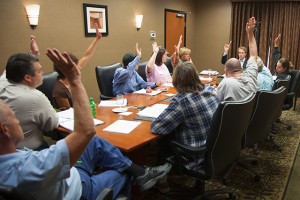When an attorney works on a case for so long, his or her mind becomes completely engulfed with the ins and outs of the arguments, how the attorney expects the opposing side to counteract, and assuming a certain outcome. Unfortunately, this dedication to a case can oftentimes make an attorney a bit blind to other important aspects of their case, including how they are perceived by a jury or the bench at the actual trial or hearing, the significance of certain trial exhibits as it pertains to supporting a claim or defense, and the fine-line in offering up just enough argument as to keep the audience’s attention and avoid confusion and/or boredom.
That’s why utilizing a mock jury focus group can be so beneficial. It’s a means of stepping outside of your position and seeing the case from a potential jury’s point of view. The attorney will begin to see where their strengths and weaknesses are in the presentation, and what aspects require work or further consideration.
Sometimes, with focus groups, only certain parts of the presentation will be communicated to the mock jurors, and it may be done by a moderator in conjunction with the attorney. The results will then be relayed back to those working on the case. However, because the idea of a mock jury focus group is so concentrated, it’s important to try and pick out your weakest or most complicated points to test, and determine how much improvement they actually need. Here are 4 tips the litigation team and attorney will learn from using a mock jury focus group:
Which Messages are Sticking
It is important to remember that you do not want to overwhelm your jury, at the actual trial. Provide them information they can handle, and give it to them slowly and in a working order. A mock jury focus group will allow litigation teams and attorneys the opportunities to see which information is absorbed best by the mock jury, and when such information should be delivered. This will answer the question as to which information sticks? And once you are a little better versed in the answer to this question, you can throw out some of the superfluous information that only seemed to cloud the jurors’ minds.
Which Arguments are Working Best
Try using different arguments about the same topic to see which one is working best. Are certain arguments better proffered together with a trial exhibit or some technology? Mock jury focus groups will give you the reactions you need to see — which one made the most sense, which one was the most convincing, and which one correlated to the rest of your arguments the best. Practice makes perfect, and mock jury focus groups are the best way to rehearse for the trial or other proceeding.
Which Mannerisms Should be Avoided
Body language can be just as important as the words coming out of an attorney’s mouth. In the case of a focus group, the actual attorney may or may not present the entire case. Regardless, the jurors will have the opportunity to comment on the attorney’s confidence during the presentation, as well as the attorney’s strength in speaking, and how the attorney carried him/herself. Charming your audience can sometimes be half the battle when it comes to convincing a jury. However, there is a fine-line in being overly confident that can be quite a turnoff to certain jurors — including how you examine a witness.
Which Juror-Characteristics are Best for my Case
Mock jury focus groups come in many flavors. Some attorneys prefer to conduct a full mock-trial, waiting until the end to discuss with the group their findings, verdicts and concerns. Others prefer to conduct an exercise in-line with a Q & A, pausing the group at times to note certain reactions to arguments, demonstrative evidence, witness testimony, etc. Regardless of the method you prefer, it is important to recognize the individual reactions and conclusions that are a result of the exercise. What were the characteristics of group members that found in your favor? Which jurors preferred the use of trial exhibits and technology? What is the commonality between focus group members who did not find your witness to be credible? These are all questions that may lead the attorney to select the actual-panel accordingly and/or have a new position as to settlement.

When it comes to legal matters, it’s important to have all the facts of the case in an easy to understand, manageable order for your jury. Mock jury focus group services should be crafted to your case, offering the right package that is proportional to scope, exposure, budget and time. Utilizing a mock jury can point out major argument and presentation flaws that you might have missed or not considered. Contact us today at Litegation to set up a mock jury focus group that is custom to your case, or for any of our other litigation support services.








